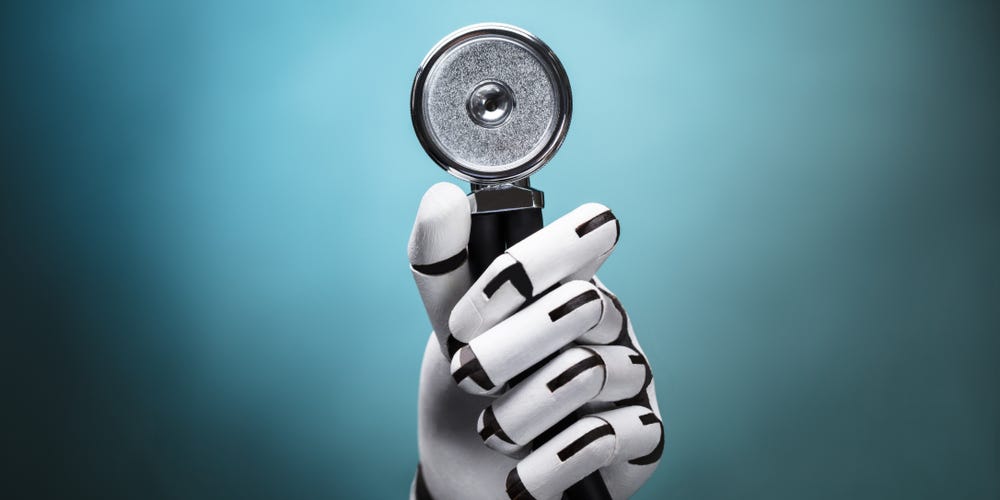In recent years, the healthcare industry has witnessed a transformative wave driven by the integration of artificial intelligence (AI) and machine learning (ML) technologies. These advancements are reshaping the landscape of healthcare delivery, from diagnostics to personalized treatment plans. The marriage of AI and healthcare holds the promise of more accurate diagnoses, efficient treatment strategies, and improved patient outcomes. In this article. We will explore the key areas where AI and machine learning are making significant strides within the healthcare sector.
Diagnostics and Imaging
One of the most impactful applications of AI in healthcare is in diagnostics and medical imaging. Traditional methods of interpreting medical images often rely on human expertise, which can be time-consuming and subject to human error. AI and machine learning algorithms are changing this paradigm by analyzing medical images with remarkable accuracy.
Machine learning models can be trained on vast datasets of medical images. Enabling them to recognize patterns and anomalies that may not be immediately apparent to the human eye. This has proven particularly valuable in the early detection of diseases such as cancer. AI-driven diagnostic tools can analyze mammograms, MRIs, and CT scans to identify potential abnormalities. Allowing for early intervention and improved patient outcomes.
Predictive Analytics for Patient Care
Another area where AI is making a significant impact is in predictive analytics for patient care. Machine learning algorithms can analyze patient data. Including medical history. Genetic information. And real-time monitoring data to predict potential health issues and complications.
By identifying patterns and trends within large datasets, AI can help healthcare providers anticipate and prevent adverse events. This proactive approach enables personalized and preventive care, reducing hospital readmissions and improving overall patient well-being. For example. AI-powered predictive analytics can help manage chronic conditions more effectively by identifying high-risk patients and tailoring interventions to their specific needs.
Drug Discovery and Development
The drug discovery and development process is known for its complexity, cost, and time-consuming nature. AI and machine learning are streamlining this process by accelerating the identification of potential drug candidates and optimizing clinical trials.
Machine learning models can analyze vast datasets related to molecular structures, biological interactions, and patient responses to different treatments. This enables researchers to identify potential drug candidates more efficiently and predict how specific individuals may respond to a particular treatment. By leveraging AI, pharmaceutical companies can significantly reduce the time and resources required to bring new drugs to market.
Virtual Health Assistants
The rise of virtual health assistants powered by AI is changing the way patients interact with the healthcare system. These virtual assistants. Often in the form of chatbots or voice-activated interfaces. Can provide immediate access to information, answer queries, and even assist in basic diagnostics.
Virtual health assistants enhance patient engagement, improve accessibility to healthcare information, and reduce the burden on healthcare providers. Patients can receive personalized health advice, medication reminders, and lifestyle recommendations through these AI-driven interfaces. This not only empowers individuals to take control of their health but also contributes to more efficient healthcare delivery.
Cybersecurity in Healthcare
As healthcare organizations increasingly digitize patient records and adopt electronic health records (EHRs), the importance of cybersecurity becomes paramount. AI plays a crucial role in enhancing cybersecurity measures within the healthcare industry.
Machine learning algorithms can detect unusual patterns of behavior that may indicate a security breach or unauthorized access to sensitive patient data. AI-driven cybersecurity tools can continuously monitor network activity, identify potential threats, and respond in real-time to mitigate risks. This proactive approach is essential in safeguarding patient confidentiality and maintaining the integrity of healthcare data.
Ethical Considerations and Challenges
While the integration of AI and machine learning in healthcare brings about numerous benefits. It also raises ethical considerations and challenges. The responsible and ethical use of patient data. Transparency in algorithmic decision-making. and ensuring equity in access to AI-driven healthcare solutions are crucial considerations.
Future Outlook
The rise of AI and machine learning in healthcare is an ongoing evolution with vast potential for further advancements. As technology continues to progress. We can expect even more sophisticated applications. Ranging from personalized treatment recommendations based on individual genetic profiles to the use of AI-powered robotics in surgery.
Collaboration between healthcare professionals, data scientists, and technology experts is key to navigating the complexities of integrating AI into healthcare systems. By addressing ethical considerations. Ensuring data privacy, and continuously refining algorithms. The healthcare industry can harness the full potential of AI and machine learning to provide better and more accessible care for patients worldwide.
In conclusion. The integration of AI and machine learning in healthcare is revolutionizing the industry by enhancing diagnostics. Improving patient care. Accelerating drug discovery. and redefining the patient experience. While challenges and ethical considerations must be navigate. The future looks promising as these technologies continue to reshape the way healthcare is deliver and experience.
You may also like
-
The Best Shilajit Brands: A Complete Guide to Quality, Purity & Performance
-
Unlocking Nature’s Secret: The Best Place to Buy Shilajit
-
Unlocking Nature’s Ancient Secret Power of Himalayan Fresh Shilajit
-
Breast Augmentation in Dubai: A Journey Toward Confidence and Contour
-
How to Start a PCD Pharma Franchise in India

